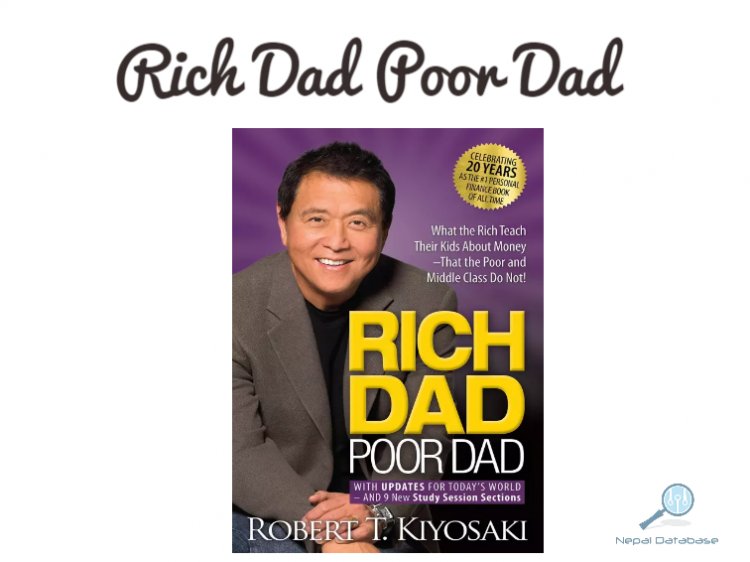50 Important Learnings from Rich Dad Poor Dad - Enhance Your Financial Education
Learn 50 key takeaways from the bestselling book "Rich Dad, Poor Dad" by Robert Kiyosaki. Improve your personal finance, investment, and financial education knowledge. Read now!

"Rich Dad Poor Dad" is a personal finance book written by Robert Kiyosaki that has become a best-seller worldwide. In the book, Kiyosaki shares his own experiences growing up with two dads – one who was financially successful and the other who struggled financially – and the lessons he learned from each of them. Here are 50 lessons from "Rich Dad Poor Dad" that can help you improve your financial literacy and make better financial decisions:
- The rich focus on acquiring assets, while the poor focus on acquiring liabilities that they think are assets.
- The rich understand the power of compound interest and use it to their advantage.
- The rich focus on maximizing their income, while the poor focus on minimizing their expenses.
- The rich invest in their education and continuous learning, while the poor rely on their job for security.
- The rich take calculated risks and learn from their failures, while the poor fear failure and avoid risks.
- The rich have multiple streams of income, while the poor rely on a single source of income.
- The rich surround themselves with like-minded individuals who inspire and motivate them, while the poor surround themselves with negative influences.
- The rich understand the importance of financial literacy and teach it to their children, while the poor rely on the school system to educate their children about money.
- The rich focus on building businesses and passive income, while the poor focus on finding a job with a steady paycheck.
- The rich are proactive and take action towards their financial goals, while the poor are reactive and blame external circumstances for their financial situation.
- The rich understand the power of leverage and use it to their advantage, while the poor avoid leverage and take on debt.
- The rich invest in assets that appreciate in value, while the poor invest in assets that depreciate in value.
- The rich have a long-term mindset and focus on creating wealth over time, while the poor have a short-term mindset and focus on meeting their immediate needs.
- The rich understand the power of negotiation and use it to their advantage, while the poor accept what they are offered without negotiating.
- The rich are strategic with their money and have a plan for their financial future, while the poor are reactive with their money and live paycheck to paycheck.
- The rich invest in their personal development and growth, while the poor neglect their personal growth.
- The rich think and act like owners, while the poor think and act like employees.
- The rich understand the importance of asset protection and plan for it, while the poor neglect asset protection.
- The rich understand the value of time and use it wisely, while the poor waste time on unproductive activities.
- The rich focus on solving problems and creating value, while the poor focus on complaining and being a victim.
- The rich understand the importance of building a strong team, while the poor try to do everything themselves.
- The rich invest in their health and well-being, while the poor neglect their health.
- The rich focus on building a strong personal brand, while the poor neglect their personal brand.
- The rich understand the power of networking and build strong relationships, while the poor neglect networking opportunities.
- The rich focus on continuously improving and learning new skills, while the poor become complacent and stagnant in their knowledge and skills.
- The rich understand the importance of managing their cash flow, while the poor neglect cash flow management.
- The rich understand the value of setting and achieving goals, while the poor neglect goal-setting.
- The rich understand the power of creating and following systems, while the poor neglect the importance of systems.
- The rich understand the importance of giving back and being philanthropic, while the poor neglect the opportunity to give back.
- The rich understand the importance of taking care of their mental and emotional well-being, while the poor neglect their mental and emotional well-being.
- The rich understand the importance of building a strong foundation for their financial future, while the poor neglect the foundation of their financial future.
- The rich understand the importance of diversifying their investments, while the poor concentrate their investments in a single area.
- The rich understand the power of visualization and use it to achieve their goals, while the poor neglect the power of visualization.
- The rich understand the importance of having a mentor or coach to guide them, while the poor neglect the opportunity to have a mentor or coach.
- The rich understand the power of persistence and perseverance, while the poor give up easily.
- The rich understand the importance of setting boundaries and taking care of themselves, while the poor neglect self-care.
- The rich understand the importance of continuous learning and growth, while the poor stop learning and growing once they leave school.
- The rich understand the power of positive thinking and cultivate a positive mindset, while the poor have a negative mindset.
- The rich understand the importance of building a strong support system, while the poor neglect the support of others.
- The rich understand the importance of setting and achieving financial goals, while the poor neglect goal-setting in their financial life.
- The rich understand the importance of being financially responsible and disciplined, while the poor lack financial responsibility and discipline.
- The rich understand the importance of building and maintaining strong relationships, while the poor neglect the value of strong relationships.
- The rich understand the importance of building a strong reputation, while the poor neglect the value of their reputation.
- The rich understand the power of goal-setting and planning, while the poor neglect the importance of planning.
- The rich understand the importance of taking care of their physical and mental health, while the poor neglect their overall well-being.
- The rich understand the power of collaboration and teamwork, while the poor try to do everything alone.
- The rich understand the importance of being adaptable and flexible, while the poor are resistant to change.
- The rich understand the importance of investing in their personal and professional growth, while the poor neglect their personal and professional growth.
- The rich understand the importance of building a strong personal and professional network, while the poor neglect networking opportunities.
- The rich understand the importance of being proactive and taking control of their financial future, while the poor are reactive and let their financial future happen to them.
These lessons from "Rich Dad Poor Dad" can help you develop a strong financial foundation, make better financial decisions, and achieve financial success.
What's Your Reaction?




































































































